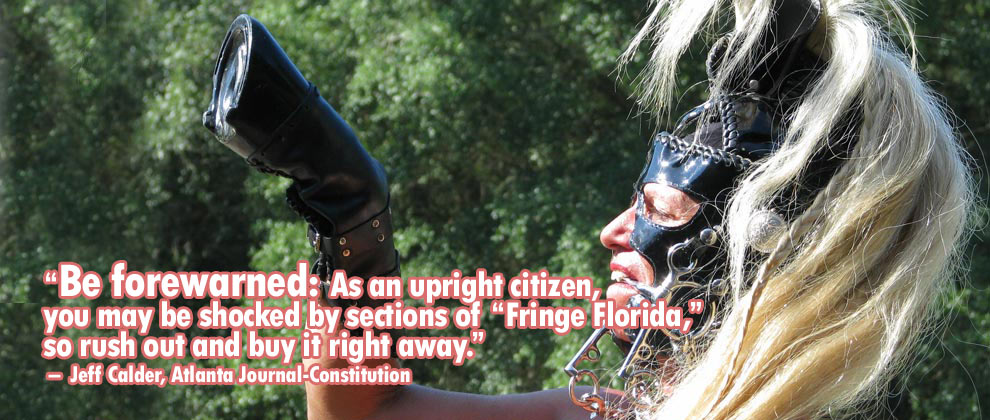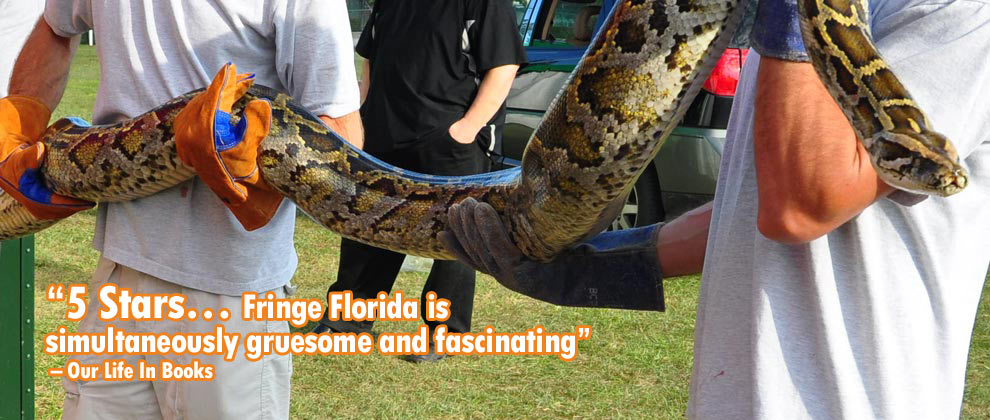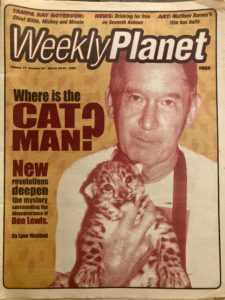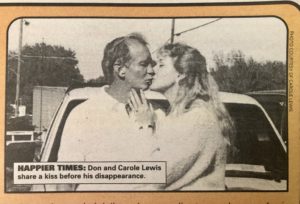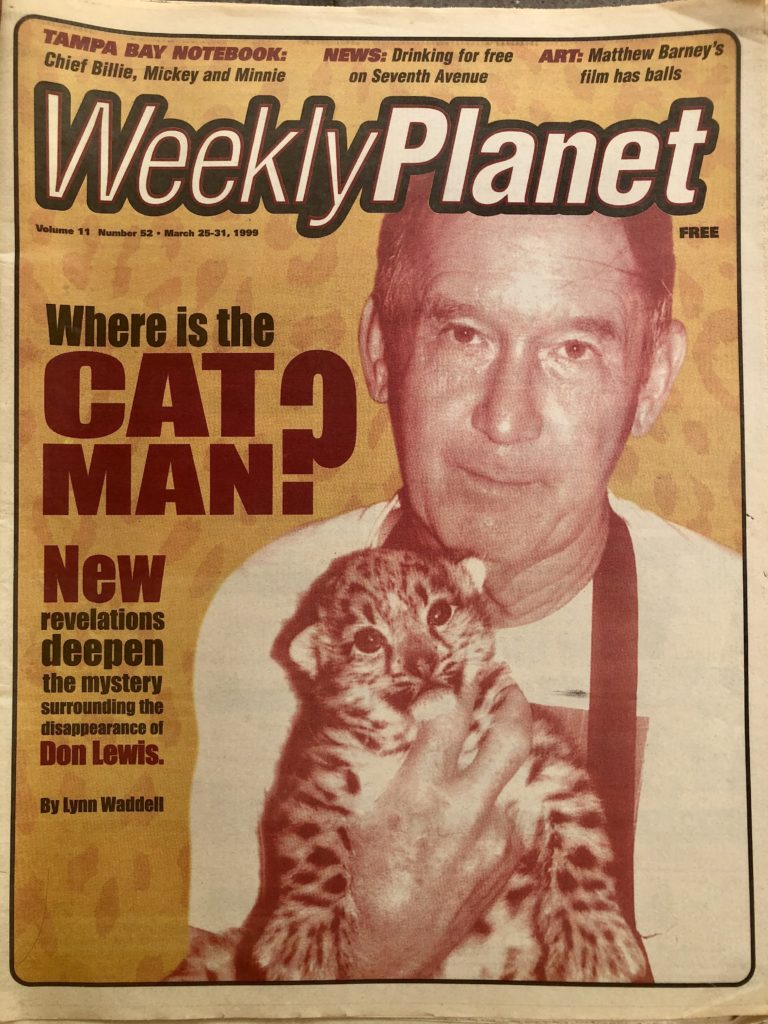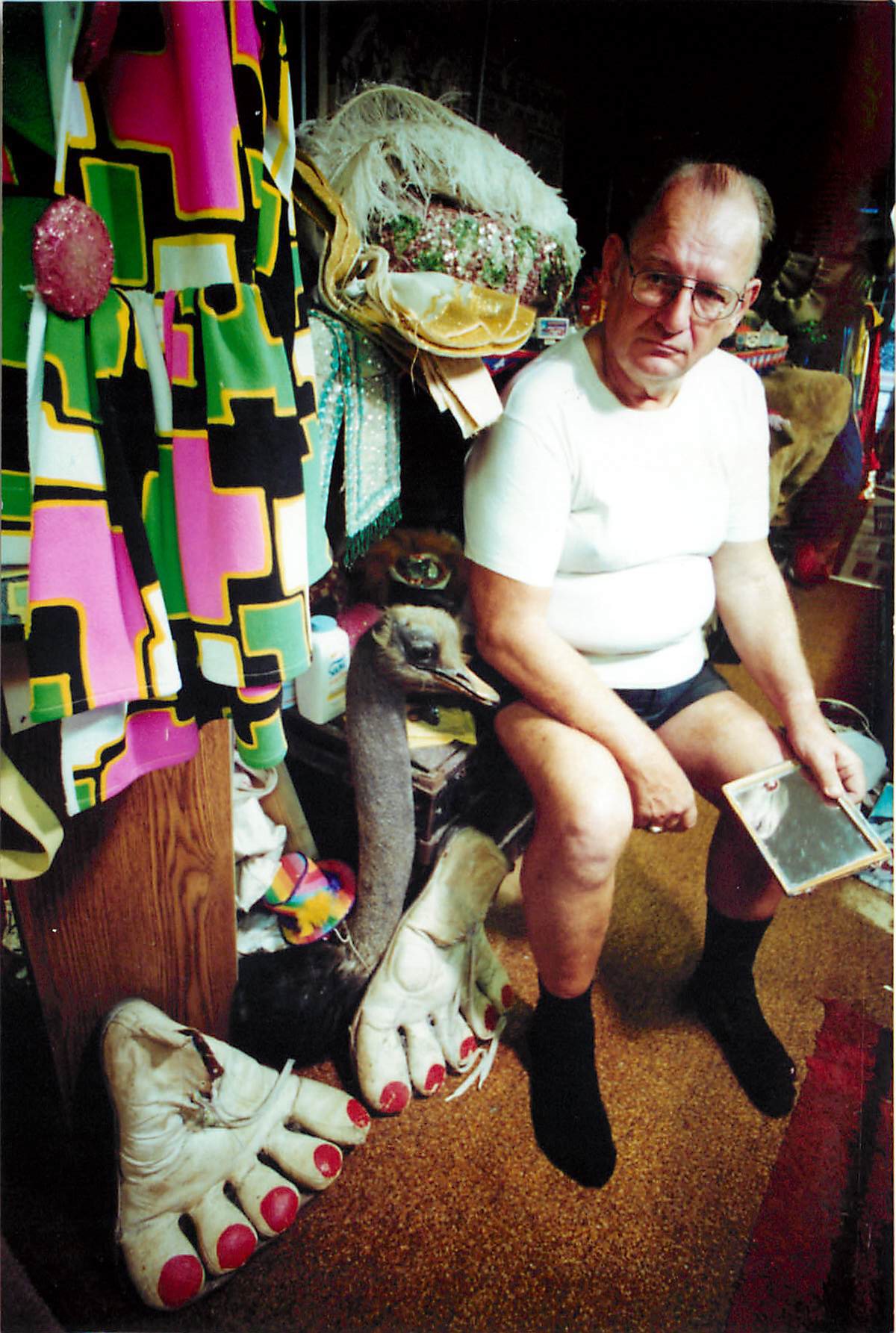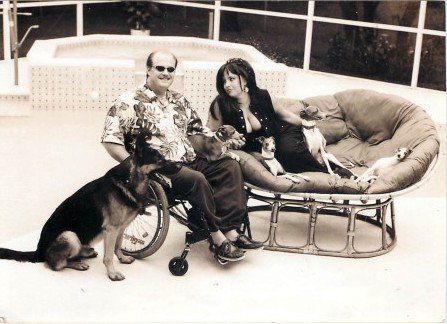Where is the Cat Man, Don Lewis? Part III
There is more to the story of Don Lewis than what’s in Netflix’s “Tiger King.” This article written about 18 months after Lewis’ disappearance was teased in the documentary. I wrote it in 1999 for the Weekly Planet, Tampa’s scrappy alternative news weekly. This is the third and final part of the lengthy article. See also Part One, or you can find the full article on lynnwaddell.com.
You can read more about Florida’s exotic animal lovers, including Carole Baskin, in my book, Fringe Florida, which is on sale this month at the University Press of Florida site. Use code TIGER for a $15 hardback and $12 paperback with free shipping this month only.
Weekly Planet article, March 25-31, 1999
Into Thin Air
On August 19, 1997, an enigmatic millionaire vanished — leaving behind a tangled web of lies, and an estate over which his heirs and associates are still snarling like the wild cats he collected. But most of all, he left behind a mystery that deepens with each strange new revelation.
(continued)
Plenty of motives
Carole Lewis’ list of suspects grows with each interview. Initially, she named McQueen, Williams and a business associate named Joe Ryan as people who may have had motive to aid in Lewis’ disappearance, or whom she considered his “enemies.” In a subsequent interview, she also named a German man in Costa Rica whom she claims threatened to kill her husband. A couple of days after the second interview she e-mailed the Planet her notes to the police from October 21, 1997, which cast aspersions on yet another person.
According to a court document filed by McQueen, about three months after Lewis’s disappearance Carole Lewis wrote in her newsletter Cat-Tales that McQueen had taken out a life insurance policy on Don Lewis and that McQueen had transferred $600,000 of Lewis’ accounts to her name.
McQueen has officially denied those accusations and called them libelous. The only life insurance policy noted in the settlement between Carole Lewis and Lewis’ adult children is for $1.25 million. It gives $400,000 to his children, $250,000 to Carole Lewis, $200,000 to McQueen and the remaining to potential claimants and Wildlife on Easy Street.
McQueen says that she put property in her name at Don Lewis’ request. Lewis was sneaky and hated to pay taxes; he often put property in other people’s names who he trusted, she said. No charges have been filed with the sheriff’s office against McQueen for any impropriety in Lewis’ financial affairs.
Carole Lewis said her husband also had about $200,000 in gold coins that disappeared with him. Williams knew about this money, she said. The seat of Lewis’ van being pushed so far back makes her wonder if Williams, a tall man, had parked it at the airport.
But McQueen said most of the gold was spent long before Don Lewis’ disappearance. About $100,000 of it was given to his first wife of 34 years, Gladys Cross, in a divorce settlement in 1996. Much of the gold was used in 1991 to settle a threatened legal dispute with a man accusing Lewis of usury, charging illegal interest on a loan.
But McQueen says Williams had nothing to gain. His reliance on Don Lewis is exactly why he wouldn’t have killed him, she said. “Don was Wendall’s gravy train.”
Another person Carole Lewis names as having a beef with her husband is Joe Ryan. And court documents show he had plenty of reasons to be angry with Don Lewis.
Lewis sold an option on a piece of land at 11509 Sligh Ave. in Seffner to Ryan for $50,600. Ryan in turn agreed to sell the land to Lazy Days for $131,000. Carole Lewis says that Ryan later decided he wanted to ask more but couldn’t because he had already signed an agreement with Lazy Days. To get around it, he asked Don Lewis to claim his option void, which would mean he didn’t own the property and thus could not sell it, she said.
Ryan, however, argues in his lawsuit against Lewis’ estate that the greedy guy was Lewis.
Lewis ultimately let Ryan out of the option, but sold the property to a Costa Rican company, Corporación Witco, which Lewis owned. Ryan claims in his lawsuit against Lewis that that company in turn sold it to Lazy Days for $225,000.
Ryan in his lawsuit claims Lewis promised to give him everything over the original $50,000 sales price and has a letter from Lewis’ to prove it. Lazy Days is still suing Ryan for damages and legal costs
Ryan couldn’t be reached for comment. His attorney, Neil Polster, when told that Carole Lewis saw Ryan as a potential threat to her husband, said: “That’s stupid. I wager that she didn’t know what he was doing less than 1 percent of the time. She may be in good faith saying that, but she just doesn’t know.”
Lazy Days General Counsel Terry Bennett said Ryan and Lewis were perfectly capable of working together. And she said she found it hard to believe anyone would kill anyone over a small piece of land in Seffner. “There wasn’t anything cloak and dagger about it.”
Carole Lewis, however, is the person who had the most to gain financially from Lewis’ disappearance.
In her 1994 journal, Carole Lewis said her husband only gave her $518 a week. The legal stipulation with his adult children now gives her $100,000 a year on top of living expenses, insurance and a vehicle.
In the long term, if Lewis fails to resurface, Carole Lewis stands to inherit almost all of his $6 million estate. After his disappearance she produced Lewis’ signed and notarized will leaving her everything but a handful of properties that will go to his adult children.
The recent settlement gives Carole Lewis control over what she stands to inherit. However, the court must approve any transaction more than $125,000. Prior to this settlement, Carole Lewis acted as co-conservator along with a court-appointed conservator over those properties and could independently make transactions up to $75,000.
Carole Lewis’ control over the estate in her husband’s absence was made possible by a durable power of attorney that she filed two weeks after his disappearance. Dated November 21, 1996, it gave her unusually broad powers of control over his estate. She drafted it, Don Lewis signed it, and it had been notarized nine months prior to his disappearance.
Carole Lewis has argued on more than one occasion in the legal wrangling over her husband’s estate that because “there is no evidence that Don Lewis is deceased” that putting his estate under the court’s control is premature.
Once the grantor of a power of attorney is dead, the document becomes void. Their assets then go into probate court.
The most glaring oddity of the durable power of attorney document is the use of the word “disappearance.” It states: “This durable family power of attorney shall not be affected by any disability or disappearance of the principal except as provided by statute and shall be exercisable from this date.”
Tampa attorney Bill Platt, who is experienced in probate work, says he’s never seen that language used in a durable power of attorney.
Carole Lewis told sheriff’s investigators that she included the word because Don was always disappearing, spontaneously taking shopping trips for exotic cats, planes and property.
She told the Planet the word “disappearance” was specifically added because she and Don feared that he might disappear in Costa Rica.
“We changed it when he started going to Costa Rica because we had read an article down there about some people who had disappeared,” Carole Lewis said. “We realized there was nothing in the documents we had that would have protected me in that sort of an event. So that was why it was in. I just expected if he would disappear, he would have disappeared in Costa Rica, and never dreamed it would happen here.”
Carole says it wasn’t unusual for her to draw up legal documents to save money. “Don hated using attorneys,” she says. “When I first started working for him in 1984 it was because he was spending $60,000 in attorney’s fees. … Those were things I could do for free.”
Carole says she had nothing to gain from Don’s disappearance. “From a financial standpoint, if Don were to die, then I stood to gain all that we had together. For Don to be simply missing I stood the risk of being in exactly the position I am in, which is to be under suspicion, and not in control of our affairs, and to watch greed and malice destroy through the ensuing legal battles all that we worked for. If I had done something to Don for my own gain, I would have to leave a body in plain sight, and an ironclad trail to anything or anyone but myself, for me to gain anything.”
Her cluttered house is no bigger or more luxurious than a doublewide mobile home. She doesn’t appear to be living in luxury since her husband disappeared. The center room of her home is a cat pen that smells strongly of cat urine, and she sleeps with a bobcat in her bed.
Strange attraction
Even though Don Lewis was 24 years her senior and no Brad Pitt, his money was not a part of her initial attraction to him, according to Carole Lewis’ 1994 journal. The journal was given to the Planet by McQueen, who says a former volunteer fished the handwritten diary out of the trash. But Carole says several of her journals were stolen and that the volunteer has been trying to sell them to tabloid television shows.
In the 1994 journal Carole describes the highs and lows of being married to an eccentric, frugal man with an irrational temper. But even when he blasted her over something as minor as buying cable TV for her daughter, she exasperatingly proclaimed her love for him.
She portrays herself as a victim of a volatile love that was unconventional from the start.
She was 19 when she met him. He was 43. She had had a fight with her then-husband, Mike Murdock, threw a potato at him and ran from their house barefoot onto 48th Street in Tampa. He yelled at her as she walked up to Sligh Avenue and 56th Street in Tampa. She had no money or gun, she wrote, but kept walking.
She spotted her husband looking for her, driving around the block. She ducked down alleys and behind houses to avoid him.
Meanwhile, another driver kept circling. The wild-eyed man inside frightened her, so she ducked into a watermelon vendor’s tent at 56th Street and Hillsborough Avenue. Later, as she left a railroad overpass, the driver pulled over and asked her if she needed a ride. “No,” she said, and kept walking.
He circled the block and came back. When he pulled over she could see a handgun on the passenger seat. He rolled down the window. He said he had just fought with his wife and needed an ear. He offered to let her hold a loaded gun on him while he talked.
For reasons she still can’t explain, Carole Murdock got into the car.
He told her his name was Bob Martin. He described himself as a poor farm boy who worked for a cruel, money-grubbing man named Don Lewis. He had a suitcase of penny wrappers stuffed with rolled-up $100 bills that ostensibly belonged to his boss.
He asked her to go to New Orleans with him. She told him she had a 7-month-old daughter she couldn’t leave. They settled for the beach instead and later a pay-by-the-hour motel.
He promised he wouldn’t try anything. Once in their motel room, he barricaded the door, brushed his teeth and got ready for bed. She joined him, wearing his baggy pajamas. They didn’t have sex, which endeared him to her all the more; “No one had ever cared about me, without wanting something in return,” she wrote in her journal.
Don and Carole continued seeing each other even though they were both married. It was nearly three years before Carole called his office and got someone who didn’t know who Bob Martin was. She described him, and the worker told her, “Why, that’s Don Lewis.”
Although Carole Lewis said she and Don grew closer and she assisted him with some real estate deals, McQueen said Carole wasn’t the only other woman in Don’s life.
She rattled off the names of six other women and added there was “a honey in Costa Rica.”
Lewis even had illegitimate children with some of his lovers, according to McQueen and Susan Aronoff, an Easy Street volunteer and friend of Carole’s.
“He had more kids than he knew,” Aronoff said. “He acknowledged them, but he didn’t support them. Some of the people he had affairs with had more than one child each with him.”
Back when Lewis was more into trucking, he had trailers and campers on the lot that often doubled for love nests, she said. McQueen recalled seeing Lewis separately take three girlfriends back to a camper in one day.
“I could never see what women saw in him,” McQueen says. “He walks funny. His teeth are crooked, and he has almost no hair.”
But what he lacked in looks, Lewis made up for in charm and courage.
“I used to listen to him schmooze women, and he was amazing,” McQueen says. “There wasn’t a woman in the world that he talked to that he didn’t try to get into her pants.”
After 34 years of marriage, his wife Gladys decided to move on. She divorced him in 1990, and Lewis married Carole Stairs (her maiden name) in 1991.
But Don Lewis’ womanizing didn’t stop.
One of the women he hit on was Susan Aronoff, who now peddles long distance phone service. Proceeds go to Wildlife on Easy Street.
“Don was very subtle about it for a very long time,” said Aronoff, whose van license plate reads “LIONLDY.”
“He’s the kind of person so unattractive to me. You wonder what the hell do women see in this man. … Don always knew the right thing to say to a woman. Don knew how to make you feel like a queen. He would spoil the woman to the point she would sleep with him. He knew how to look into people for their strengths and weaknesses, exactly how to manipulate you for one reason or another. He always knew what vein to cut.”
Although Don Lewis continued to prowl, infidelity doesn’t appear to be the source of his marital problems. Witness accounts and Carole’s journal show the couple’s strife revolving around Wildlife on Easy Street. Carole often accused Don of mishandling the cats and complained that he was junking the place up with his bargain purchases.
Lewis, a businessman to the core, may have loved the big cats, but not so much that he wouldn’t sell some of them.
“He didn’t have a hard time selling them or giving them away,” Aronoff said. “But some of them were his babies. The ones that were his babies were his forever. If they represented a dollar sign, yes, they were gone.”
Carole Lewis, on the other hand, views all the cats as her children.
Williams said the differing views prompted fights, especially before Lewis disappeared; he was planning on taking 23 cats with him to Costa Rica. She didn’t want him to take any of them.
McQueen said at the time Carole Lewis told her that Don was so mad that he threatened to kill every cat there by feeding them anti-freeze.
Tensions about the exotic pets began long before that, according to Carole’s 1994 journal.
She wrote of July 9, 1994: “We have over 60 cats now and he spends 11-24 hours a month, calling long distance, trying to buy more cats, but he doesn’t want to build pens for them and crowds them together (tonight a Cougar killed a house cat) or he puts them in unfinished pens (without consulting me) and they escape (like last night, when a Bobcat and a Canadian Lynx got out and took three of us several tense hours to recapture). He had let 10 exotics in that pen within 8 hours of me telling him it was not safe. Then rather than finish the pen he decided to have all the workers spend all day Friday getting a load of personal effects loaded into vans and trailers for his grandson to have a yard sale, which would have seemed like a family thing to do, except that the stuff isn’t his. He bid on it through the U.S. Bankruptcy Court and agreed to store it for them. He doesn’t have any idea if the owner will redeem the property, or if someone else will bid higher. When I reminded him of this he just said I’m only selling part of his stuff. Today he spent at Tampa Machinery Auction, buying more junk, although we are under citation by the county to clean up his “dumping site” and remove all inoperative vehicles (which is most of them). One car is completely engulfed in a hornets nest. How long since he’s even seen whatever it used to be, that he just had to have.”
Two months before Don Lewis vanished, the couple had such a disagreement over his collection of equipment that he filed a petition for injunction for protection against domestic violence.
“This is the second time Carole has got angry enouf (sic) to threaton (sic) to kill me,” Don Lewis wrote in the petition.
On the petition’s questionnaire asking to indicate situations he had experienced, Lewis placed three “x’s” by “respondent has ready access to a firearm.” He also checked that he had received verbal threats and suffered emotional distress.
The Hillsborough Circuit Court Judge denied Lewis’ request, the reason: “No immediate threat to do violence.” (The word immediate was underlined in the court document.)
Don Lewis wrote on the injunction request that while he was away Carole gave two junk men permission to remove trucks and equipment stored on their property. Lewis was holding the equipment as collateral for a $17,000 loan to Wendall Williams. Lewis said Williams had to call the sheriff to prevent the men from taking the equipment.
Carole Lewis said, “I never threatened to kill him. The worst thing I ever did was threaten to report him to the IRS.”
She admits that Don Lewis’ collection of stuff around their house was getting on her nerves, but claims he was mentally unbalanced.
“He always did that. But originally, he brought home things that were useful,” she said. “Then he started bringing home things like the cardboard boxes of unwanted junk leftover after garage sales.”
Carole Lewis claims she became concerned that her husband was suffering from the early stages of Alzheimer’s. He would call her and not know where he was, she said. She insisted that he get a physical and an MRI. The test results showed no signs of Alzheimer’s, but Lewis was diagnosed with bipolar disorder, she said.
But even that’s disputed. McQueen said she set up the physical and Lewis was given a complete clean bill of health.
Still Missing
Today about all that remains of Lewis’ junk pile is an old blue wooden boat with the words “Das Boot” spray painted in neon on its side. Many of the cats have their own pens now, and they have soil underneath their feet instead of slabs of concrete as they did before.
Wildlife on Easy Street has ironically benefited from the publicity of Don Lewis’ disappearance. Its slick Web site is bannered by “As seen on Dateline NBC and as featured in People Magazine.” Outside donations have climbed from $32,000 in 1996 to $176,000 in 1998. Lewis’ contribution has also increased from $154,000 in 1996 to $222,000 in 1998. The operation’s overall budget has climbed from $186,000 to $398,000 since Lewis disappeared.
But the improvements on Easy Street may have nothing to do with Lewis’ disappearance. Carole Lewis says it hurts to have people think she would have done anything to her husband. The accusations about feeding him to the cats she finds impractical; the exotic cats won’t just eat anything, she said. They feast on chicken.
Susan Aronoff gets huffy at insinuations that Carole Lewis fed her husband to the wild cats.
“Anything a tiger eats comes out,” Aronoff said. “Human bones are going to show no matter what. (The accusation that she fed him to the cats) opens it up to every trash television show wanting to come out and film these tigers. The person who had most to lose would have been Carole. If it were Carole she’s too smart to do it that way. She has so many people to contend with.”
By law Don Lewis cannot be declared dead until his body is found or five years pass. Because of that, everything he owned is held in probate, limiting what Carole can do with it.
Aronoff believes that’s just what Don wanted. She’s one of the few who believe he is still alive, playing a contemptible prank on his family.
“I believe with all my heart that he will show up,” she said.
Carole Lewis and Aronoff say he considered his children traitors for siding with his first wife in a money dispute in 1996.
“I think he’s doing it to see the reaction to his children,” Aronoff said. “He’s very spiteful. They went right for the money. They did exactly what he disinherited them for in the first place,”
The idea that Lewis could be murdered strikes Aronoff as odd, for Lewis was always armed, she said.
Many others who knew Don Lewis have no doubt he was crafty enough to pull off a disappearing act. After all, he made millions by his wits alone.
“I could see him somewhere thinking this is the funniest thing he ever saw,” says Lazy Days attorney Bennett. “He always saw it as his best advantage that nobody knew better about him. I mean here was a guy that you really can’t even answer whether he could read or not.”
Carole Lewis says her husband was functionally illiterate. McQueen says not only could Don Lewis read, but that he had caught flaws in contracts. Several volunteers say he told them he quit school after sixth or seventh grade, but Pasco County school records show he graduated from high school a year ahead of schedule in 1955 from Pasco High School.
Williams says he believes Lewis is capable of disappearing without a trace, he just doesn’t think he would leave $200,000 in the bank.
“Don didn’t have much money until the last 10 or 15 years,” Williams said. “He always lived like he didn’t have any, but he would have died fighting for it. The problem is who helped him disappear didn’t know he had that money.”
McQueen also can’t believe Lewis would have left the money in the bank. “No sane person would leave $200,000,” she said.
But Lewis’ extreme paranoia leads Aronoff to believe he had other money hidden.
“Don might not keep money in the bank. He was the type who buried it in the ground. He’s gone somewhere with a large sum of money. And he’s the kind of person who will turn the mole hill into a mountain. People with all this sensationalism on their brains will be disappointed when Don comes walking home.”

